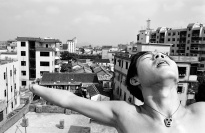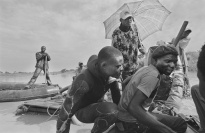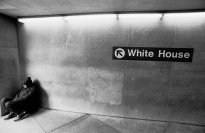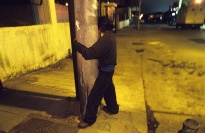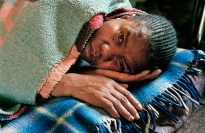About Moving Walls 12
The six photographers in Moving Walls 12 cover a range of subjects: entrenched poverty and discrimination in Europe and the United States, the path of diamonds from miner to consumer, an intimate view of the impact of stigma and violence, and the massive changes taking place in the new China. Yet each photographer confronts uncomfortable issues that strike at the heart of the open society mission and help elevate the role of documentary photography as an advocacy tool.
With an outsider’s perspective on the United States, Kike Arnal reveals the extreme poverty that exists in the capital of the world’s wealthiest and most powerful country. The portrait he offers of Washington, D.C.—with its staggering rates of homelessness, HIV infection, and violence—contrasts starkly with the idea of the city as a center of global influence.
Using powerful attention to detail, Jodi Bieber’s triptychs are a grim portrayal of the scenes, weapons, and faces of domestic abuse. But beyond the testimonies of South African women who survived years of beatings by their partners, the pictures tell of a culture of violence against women—one that persists in South Africa and across the world. Donna DeCesare’s portraits document the lives of Central American and Colombian children living with AIDS, surviving as sex workers, or struggling with the scars of war. They carry a burden of fear and stigma that leaves them seeking a safe environment in which they can share their secrets.
In his images of Roma throughout Europe, Nigel Dickinson has captured the daily lives of the continent’s largest and most persecuted minority. Locked out of opportunity and forced to live in segregated communities, the Roma in Dickinson’s photographs have retained a vibrant culture and strong identity in the face of centuries of discrimination. Arriving in China a day after the Tiananmen Square massacre, Mark Leong was uniquely placed to document the country’s economic and social transformation as it embraced capitalism and abandoned its socialist ideals. His photographs show ordinary people seeking their place in a reconfigured society.
Kadir van Lohuizen takes a broad view of the diamond industry with his images following the stones from Congolese mines to the hands and necks of affluent Western women who know little about their origin. As they make their way across continents, a story unfolds of exploitation, massive profits, and the complexities of global capitalism.
With the premiere of Moving Walls 12, the Open Society Foundations are amplifying their commitment to the work of photographers striving to bring attention to subjects that have not found an outlet in traditional media. At the same time, we are broadening our efforts to expose new audiences to the documentary form, with the first international Moving Walls currently on tour in the Middle East, the Caucasus, and Central Asia.

